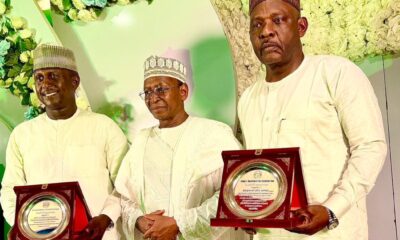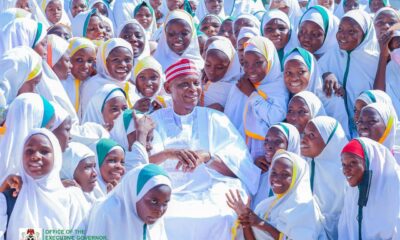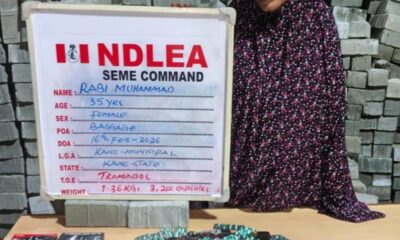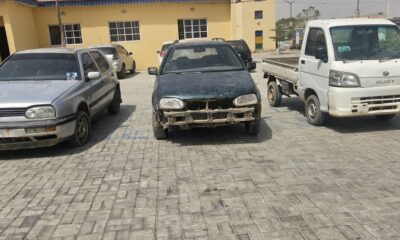Opinion
Kperogi: A captive of raw emotions

Professor Aliyu Barau
In adding my voice to the latest Kperogi’s punch on the Emir of Kano MSII; I opt to go the way of science. Scientists deploy tools such as ‘research questions’ to find answers for what is unknown and use ‘research hypothesis’ on things which little is known about both in theory and practice. Examples of research questions could be: ‘can influential individuals help the government’s economic policies?’; or ‘can an Emir speak openly in a democratic setting? Examples of research hypotheses could be: ‘Kperogi is a confused academic and journalist’; or ‘Kperogi is not a sadist academic.’ After conducting a study scientists find answers to the research questions through multiple opinions, perspectives, and contexts that deepen our understanding. For research hypotheses, we accept or reject whether Kperogi is indeed a sadist or not, a confused academic/journalist or not. If you profess professorship, you must divorce sentiments. Kperogi’s overloaded bag of insults are unguided by science or decent knowledge. For him, English is a language and a rough and raw tool to misinform the uninformed living in the neo-Babel Tower.
According to myths, arrogance and ignorance made humans build the Tower of Babel to outsmart God. Then, God avenged by sowing confusion and strife among them by making them speak different languages. When humans cannot understand each other bitterness flourishes. Thus, language underpins conflicts and is a strong weapon of disseminating misinformation and disinformation. On the other hand, the Ivory Tower is the rendezvous of knowledge, though an idiom – to ‘live in the Ivory Tower’ denotes being inexperienced or disconnected from the world realities. Nigeria is a Babel Tower in its own right and its Ivory Tower is both amazing and disgusting. Kperogi belongs to both towers – one for a curse and the other for a cause.
I am prompted to pick holes in the ways Kperogi takes a swipe on Mallam Muhammadu Sanusi II, the Emir of Kano. Of course, I am not raising a firewall to fortify the Emir. It is apparent that Sanusi has been in the crosshairs of Kperogi – who lays siege looking for any possible angle to strike. I am particularly distressed by the hideous and superficial scholarship that Professor Kperogi personifies. In 2022, I felt it was compelling to respond to Kperogi’s nonsense when he shamelessly threatened to renounce his Nigerian citizenship should Tinubu emerge as Nigeria’s President. I don’t think Kperogi is the right person to write about the rift between Tinubu and Sanusi because both of them are clowns in the sight of his pen. I know it is not a repentance, and I hope it is not a means to curry favour with Tinubu’s camp. Writing on Sanusi’s Lagos outburst, I expect Kperogi to be deeply critical and analytical.

Academics and outstanding journalists have emotions, but their professionalism guides them to be careful, disinterested, and cautious. I remember the clash of the African giants – Ali Mazrui and Wole Soyinka in the 1990s. It was a merciless and smoldering battle of pens from whose storm settles dazzling knowledge and mastery of language. The duo fired salvos at each other with supreme argumentation exuding sounds and aromas of philosophy, faith, science, logic and above all critical thinking. Kperogi’s attacks on Sanusi are essentially based on ‘out of context statements’ and very unscholarly. Expectedly, the Tinubu’s government responded through boilerplate statements typical of the Nigeria Government media portfolio. For Kperogi, everything is about Sanusi’s hubris and unguarded orals. To me, there is more to this, the examples of questions and hypothesis that I have raised drive how I respond to Kperogi’s unscholarly take on the ‘text’ instead of the ‘context’.
African leaders like their counterparts everywhere can be understood better by looking at their complete lifecycle. This can be achieved through readings to dissect their histories, thinking, feelings, physique and emotions. PBS’ Frontline documentaries cover leaders such as MbS, Putin and Xi Jinping by tracing their lifecycle and stages. Each film on these personalities traces their childhood moments to background how and why they behave the way they do. Critics of Sanusi should at least use Johari Window theory (from Joseph Luft and Harrington Ingham) to understand him in light of the theory’s four windows. Although this theory is meant for individuals to understand themselves heuristically, we can apply it in understanding why people behave the way they do.
There are many Nigerians – living under democratic atmosphere- who wish to see Sanusi and the like silenced or be as silent as a statue. Such people think traditional rulers are meant to be permanently reticent. Such notion or belief is actually backgrounded in colonial mentality and is aimed at gagging the colonized. The British royals are known for observing what is called ‘stiff upper lip’. I am not disputing royal etiquettes which also weakens progressively with time. However, in recent times, we have seen how Prince Harry, born by the stiff upper lip, butchered it in the most horrendous way. Even the heir-apparent, Prince William is widely reported calling the royal stiff upper lip dangerous to their mental health. Kperogi should learn to let Sanusi speak his mind. On the other hand, it is insulting that traditional rulers are caged as ‘agents’ of every governor or government – the good, the bad, the ugly.
On the matter of his friends, unknown to Kperogi, methinks Sanusi plays very smart and proud in his talks. As an economist, he knows the value of the ‘Stop Rule.’ It is called the hard-and-fast simple rule of avoiding frustration. Gerald M. Loeb (1899-1974) in his classic, The Battle for Investment Survival cautioned that investors must apply a Stop Rule once the values start declining. Maybe, Sanusi applies the Stop Rule to his friends whose behaviors apparently honk at him signaling devaluation of the friendship. Many scientists postulate that only 20% and to the maximum of 50% of our friends are real, others are just numbers.
Relatedly, many people felt Sanusi is a narcissist for saying he withheld his advice to the government. I see it differently, individuals with knowledge and proven track records can help governments to turn around the economy. The controversial US ‘Prime Minister’ Elon Musk as Jeffery Sachs calls him is an example. Today, no one in Nigeria would deny that petroleum pricing including subsidy removal is the most frustrating economic issue for both Government and the citizens. Again, nobody can deny that Ali Dangote is the most important private sector player in the petroleum sector. In Nigeria, nobody can deny that the Government has frustrated Ali Dangote to the highest skies. Nobody can deny that Dangote is inflammably incensed. Dangote’s historic shame-breaker investment in the sector should earn him the best spectacular rewards and not the hell he sees. In the US, Beta, Apple, Amazon, Google, Walmart and many others are seen as the face of America and these giants enjoy apparent and cryptic support from every Government in the US. In China Tiktok, BYD and Alibaba and the rest are seen by the Government as the scions of the Government. Dangote is being orphaned and humiliated. This dehumanizing treatment Dangote is receiving is costly for Nigeria. It will take years and prime efforts to fix it. I learned that some investors from North Africa recoiled on the grounds that if Dangote is mishandled in his fatherland, what would be for them. Now, nobody in Nigeria can deny that Emir Sanusi and Dangote are trusted friends. I assume Sanusi could ‘help’ the government to reconcile with Dangote. The Government needs to be assisted to restore the confidence of local and foreign investors. Dangote testimony is about the only one that investors would believe and not any choreographed statements of the Government.
This is how I choose to deconstruct Kperogi by adding my opinion and perspectives to answer the question I raised in the beginning. It is left to the reader to either accept or reject my hypothesis on who actually Keprogi is. One thing I am sure of is that Kperogi’s pen swims in raw emotions. I repeat that betrays his academic ranking and position which I queried for being not-flying in my earlier treatise on his petty products.

Opinion
Abba Care: A Lifeline of Compassion in Kano State

Lamara Garba Azare
In Kano State, compassion has found structure. It has found funding. It has found direction. Under the leadership of Governor Abba Kabir Yusuf, healthcare is no longer a privilege negotiated by wealth; it is a right strengthened by policy. What is unfolding across the state is more than reform. It is a moral commitment woven into governance. It is Abba Care.

At the heart of this transformation is the introduction of free antenatal care and free delivery services for pregnant women in public health facilities. For countless families, this single decision has lifted a burden carried in silence for years. Pregnancy, once shadowed by fear of hospital bills, is gradually becoming a journey supported by public responsibility.
A visit to Murtala Muhammed Specialist Hospital in the heart of Kano tells the story better than statistics ever could. The maternity sections are vibrant with activity. Pregnant women arrive daily for routine checks, scans and medical consultations. The waiting areas are filled not with despair, but with expectation. The large turnout reflects renewed trust in government facilities. It demonstrates that when care is made accessible, citizens respond.
The visible reduction in maternal mortality in the state is no accident. It is the natural outcome of access. When women attend antenatal clinics regularly, complications are detected early. When deliveries take place in properly equipped facilities under trained supervision, risks are significantly reduced. Lives are saved quietly, steadily and consistently.
But Abba Care goes beyond maternity services. Through the initiative and the Basic Health Care Provision Fund interventions, free medical services are extended to pregnant women, children under five, sickle cell patients, the elderly aged 65 and above, and persons living with disabilities. It embraces those who often stand at the fragile edges of society. It ensures that vulnerability does not translate into abandonment.
Beyond direct service delivery, the administration has deliberately strengthened and revitalised key health institutions. While the Kano Health Trust Fund and the Drug and Medical Consumables Supply Agency predated the current administration, they have received renewed direction and operational momentum.
When this government assumed office, drug availability in public health facilities stood at below 30 percent. Today, availability has risen to over 95 percent, ensuring that patients who visit government hospitals are far more likely to receive the medicines prescribed to them. That shift has restored confidence in public facilities and reduced the burden of out-of-pocket spending.
Similarly, the Kano Health Trust Fund, once relatively unknown within the system, has emerged as a strong pillar of support across the sector. The Fund provides financial backing to primary, secondary and tertiary health facilities. It supports health-related Ministries, Departments and Agencies and extends assistance to health training institutions. In doing so, it strengthens infrastructure, manpower development and service delivery across multiple levels of care.
Most significantly, the recent establishment of the Kano State Centre for Disease Control has positioned the state as a pioneer in subnational health security, making Kano the first in Nigeria to create such a structure with regulatory authority over communicable and non-communicable diseases. Together, these institutions form a coordinated framework that reinforces the government’s commitment to quality, accessible and resilient healthcare delivery.
Speaking on the mandate of the Centre, its Director-General, Prof. Muhammad Adamu Abbas, described the agency as a defining milestone in the state’s public health journey. He explained that the Centre is designed not only to respond to outbreaks but also to strengthen surveillance systems, coordinate rapid response teams, regulate disease control programmes and deepen community engagement in prevention efforts. According to him, the agency has already undertaken case management activities, public sensitisation campaigns and field investigations in communities where suspected infectious diseases were reported. He reiterated its commitment to preparedness, transparency, scientific evidence and strong collaboration with partners and stakeholders.
Equally reassuring is the Kano State Emergency Medical Services and Ambulance System (KN-SEMSAS). This initiative provides free emergency response and treatment to victims of automobile accidents, gunshot wounds, violent attacks and other critical situations. Pregnant women in distress, patients with hypertension, people living with HIV and individuals battling terminal illnesses are attended to without hesitation over payment. In moments when seconds matter, government intervention becomes the difference between survival and tragedy.
The circle of compassion widens further. Inmates of correctional and rehabilitation homes, as well as elderly residents in Shahuci homes, are also beneficiaries of free medical services. These are citizens who might otherwise be overlooked in policy conversations. Yet under this administration, they are remembered, included and protected.
There is philosophy in this approach. A government reveals its character by how it treats the weakest among its people. When the elderly can access treatment without fear of cost, dignity is restored to ageing. When children under five receive free care, the foundation of the future is strengthened. When persons living with disabilities are covered, inclusion becomes practical rather than rhetorical.
Governor Abba Kabir Yusuf’s leadership style reflects calm resolve. He does not merely speak about compassion; he institutionalises it. Abba Care is not charity. It is structured empathy translated into sustainable intervention. It recognises that public office is a trust and that power must bend toward the protection of life.
Across Kano, families now speak with relief rather than anxiety. A father no longer calculates whether he can afford treatment for his sick child. A mother no longer postpones clinic visits due to registration fees. An elderly citizen walks into a health facility knowing that age has not diminished his worth in the eyes of government.
Healthcare reform may appear technical on paper, filled with acronyms and budgets. On the ground, however, it is deeply human. It is the smile of a discharged patient. It is the cry of a newborn delivered safely. It is the quiet gratitude of a grandmother whose blood pressure is managed without financial strain.
Abba Care represents a broader belief: that development must begin with people. Roads and buildings matter, but healthy citizens matter more. By investing in maternal health, emergency services, chronic illness care and protection for the vulnerable, Kano State is shaping a future anchored in human wellbeing.
Since the introduction of this policy, the impact is visible. Confidence is growing. Trust between government and the governed is deepening.
More importantly, in safeguarding mothers, children, the elderly, the sick and the marginalised, Kano safeguards tomorrow. Abba Care stands not merely as a policy, but as a living reminder that leadership, when guided by humility and compassion, can touch lives in the most profound ways.
Lamara Garba Azare, a veteran journalist, writes from Kano.

Opinion
Lamin Sani Kawaji: The Gallant Commander Behind Murtala Sule Garo

Abubakar Shehu Kwaru
There is an adage that behind every successful leader stands a dependable ally—one who offers moral discipline, commitment, ability and an unwavering desire to make meaningful impact. Leadership is rarely a solo endeavour; it thrives on loyalty, sound counsel and shared vision.

It is widely acknowledged that a good leader is one who listens to the views, suggestions and constructive criticism of close associates on matters of socio-economic and political importance. In Kano’s political landscape, one of such tested and proven leaders is Murtala Sule Garo, who has served in various capacities and was presented by the All Progressives Congress (APC) as its deputy governorship candidate in the 2023 elections.
The political milestones recorded by Garo cannot be separated from the dedication, loyalty and strategic support of those around him. Prominent among these trusted allies is Honourable Lamin Sani Kawaji, the current Chairman of the APC Caucus in Nassarawa Local Government Area.
It would not be an exaggeration to describe Honourable Kawaji as one of the key commanders supporting their “grand commander” and youthful political leader, Honourable Garo. For nearly two decades, I have maintained a close and personal relationship with both men, observing firsthand their political evolution and shared journey.
In Honourable Kawaji, I have found an honest and principled leader—hardworking, disciplined, punctual and accountable. He is a man who matches words with action and exemplifies prudence and reliability in public service.
Born and raised in the ancient city of Kano over five decades ago, Kawaji has built an impressive record across various spheres of public life. Despite the inevitable challenges and bottlenecks that accompany political growth, he has remained steadfast—an attribute common to many successful individuals.
Popularly known as “Dan Sani” among admirers, he hails from the respected family of the renowned Islamic scholar, Sheikh Sani Zawiyya of Koki quarters in Kano Municipality. His upbringing laid the foundation for his discipline and commitment to community service.
Honourable Lamin Sani Kawaji was first elected Executive Chairman of Nassarawa Local Government Council in 2013 and was re-elected for a second term in 2016. During his tenure, he initiated policies and programmes that transformed the council, ensuring that residents benefitted from the dividends of democracy.
His administration prioritised improvements in education, healthcare service delivery, infrastructural development, youth and women empowerment, and the creation of a conducive atmosphere for commercial activities. Public service efficiency also received significant attention under his leadership.
Like his political ally and mentor, Honourable Garo, Kawaji also served as the Kano State Chairman of the Association of Local Governments of Nigeria (ALGON), further strengthening his credentials in grassroots governance.
Upon the expiration of his tenure as Executive Chairman, the then Governor of Kano State, Abdullahi Umar Ganduje, appointed him Special Adviser on Local Government and Chieftaincy Affairs. Following Garo’s nomination as the APC deputy governorship candidate alongside Nasiru Yusuf Gawuna in 2023, Kawaji was appointed Commissioner for Local Government and Chieftaincy Affairs to replace him in the ministry.
In that capacity, he performed beyond expectations, consolidating reforms and sustaining administrative efficiency.
Political observers will recall that Garo and Kawaji played significant roles in the APC’s 2019 electoral success, which secured a second term for Governor Ganduje and his deputy.
Today, Honourable Kawaji remains a grassroots politician committed to complementing governance efforts in Kano State, including developmental initiatives under the present administration of Abba Kabir Yusuf.
Indeed, the partnership between Honourable Lamin Sani Kawaji and Honourable Murtala Sule Garo demonstrates the enduring value of loyalty, teamwork and shared political vision. With faith, perseverance and strategic collaboration, their journey in public service continues to reflect the timeless maxim: one with God is always in the majority.
Abubakar Shehu Kwaru is a seasoned journalist who writes from Mandawari Quarters in Gwale Local Government Area of Kano State.

Opinion
2027 begins in Kano: Abba Kabir Yusuf formally received into APC as Tinubu consolidates northern political stronghold

Lamara Garba
From the moment Vice President Kashim Shettima touched down at Malam Aminu Kano International Airport, the ancient city shifted into a different rhythm. The roads leading from the airport were not merely crowded; they were alive. Traders, market women, civil servants, and artisans abandoned their stalls and workplaces for a glimpse of the visiting dignitaries. Young men climbed rooftops and signposts, while elderly men in flowing babbar riga stood shoulder to shoulder with restless students waving party flags.

The chants rolled like thunder along Airport Road, through Fagge quarters, down Murtala Mohammed Way, and into the arteries leading to the city’s historic heart. It was not the choreography of hired enthusiasm; it was organic, loud, and unmistakable.
By the time the convoy approached the iconic Sani Abacha Stadium, the streets had become a river of humanity. The stadium itself seemed too small to contain the emotion that poured into it. In that moment, one truth stood firm: this was no routine political reception. It was a public declaration of belonging — that Governor Abba Kabir Yusuf belongs to the people of Kano, and that the people, in turn, belong to him.
The formal reception of Governor Yusuf by the national leadership of the All Progressives Congress (APC) was described as a homecoming. Yet it felt deeper — almost philosophical. At its highest form, politics is about alignment: of interests, of vision, of destiny. On that day, Kano appeared to signal that its destiny must sit at the table where national decisions are shaped.
Representing President Bola Ahmed Tinubu, Vice President Shettima addressed the sea of supporters with deliberate clarity. Kano, he noted, is too strategic to stand at the margins of Nigeria’s future. His tone carried both political calculation and historical awareness. Kano has always been more than a state; it is a compass. When Kano moves, Nigeria feels it. When Kano speaks, the federation listens.
His remarks were not mere pleasantries. They underscored the significance of Governor Yusuf’s entry into the APC — not as a simple addition, but as the strengthening of a pillar. Kano’s economic vibrancy and political consciousness, he suggested, are integral to the broader national development agenda.
The Chairman of the Progressive Governors’ Forum, Hope Uzodinma, described Yusuf’s defection as a return home. In politics, the language of homecoming is potent; it softens rivalry and reframes past tensions as steps toward reunion. Uzodinma went further, calling Kano the “brain” of Nigerian politics — a metaphor that resonated deeply with the crowd. A brain directs, calculates, and interprets. By that logic, Kano’s alignment with the APC signals direction for the country.
Similarly, the party’s National Chairman, Nentawe Yilwatda, portrayed the moment as an infusion of fresh momentum. He spoke of progressive ideals and shared responsibility, emphasising that the governor’s entry would enrich rather than dilute the party’s character.
Standing like an elder statesman observing the unfolding of history, former National Chairman Abdullahi Umar Ganduje declared the party in Kano stronger and more united than ever. In Kano’s political theatre, unity is currency. His words suggested that previous fractures had been stitched into a single fabric.
Yet beyond the speeches was the quiet but powerful statement made by the crowd itself. No script can manufacture such enthusiasm. Thousands who lined the streets and filled the stadium were not merely witnessing a political transaction; they were affirming their governor. Their presence was a reminder that leadership, ultimately, is validated by followership.
Governor Yusuf balanced gratitude with principle. He pledged that his new political alignment would not compromise his pursuit of fairness and justice. Defections often invite suspicion, but he framed his decision as pragmatic rather than opportunistic — a strategic move to widen the channels through which Kano’s aspirations could be realised.
There was symbolism, too, in the earlier announcement of federal support for Kano’s recovery from recent challenges. The financial backing from the federal government and the governors’ forum was presented not merely as relief but as evidence of partnership. In politics, resources often follow relationships. By stepping into the APC fold, Kano was not simply changing party colours; it was strengthening its access to the levers of federal influence.
What unfolded at the stadium was layered. On the surface, it was a mega rally filled with music, banners, and applause. Beneath that surface, it was a recalibration of political equations ahead of 2027. Kano’s electoral weight can tilt national outcomes. Any party that secures Kano secures more than votes; it secures narrative dominance in the North.
Philosophically, the event underscored a timeless truth about power: it abhors isolation. In a federal system as complex as Nigeria’s, alignment between state and centre often determines the pace of development. The rally conveyed a shared understanding that Kano’s ambitions are best pursued in concert with the ruling party at the national level.
As the sun dipped over the ancient city and the crowds gradually dispersed, one could sense that something had shifted. Kano had spoken — not in whispers, but in waves. Whether history will judge the decision kindly remains to be seen. But on that Monday in February, the message was unmistakable: the political map of Kano had been redrawn, and the ink was still fresh.
Lamara Garba, a veteran journalist, writes from Kano.





















